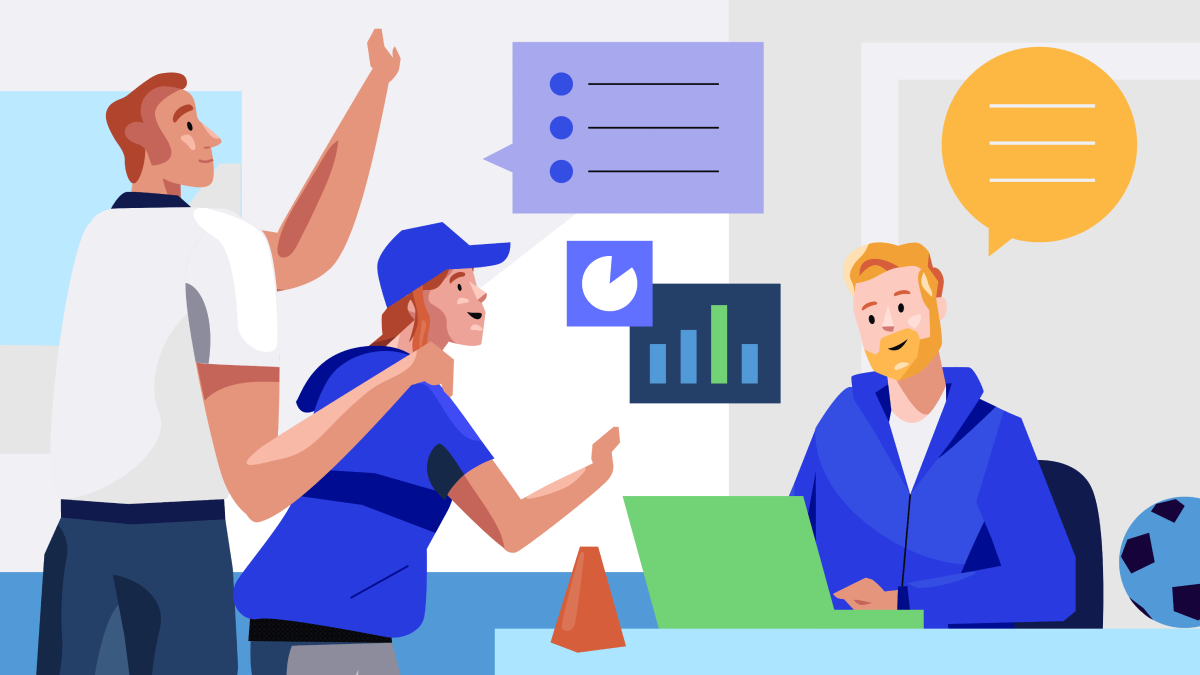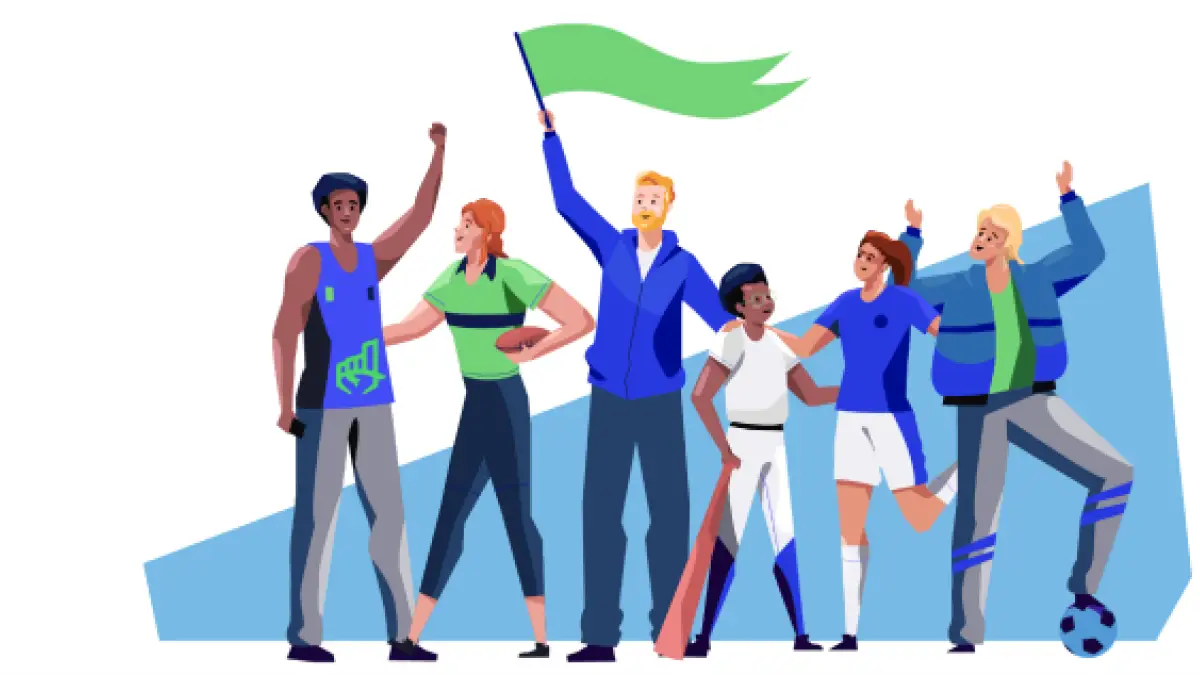
Discover how to effectively manage client feedback through active listening, analysis, and communication to enhance client satisfaction.

Your front desk employees are the face of your brand. They represent you, your company, and your brand.
When a client walks in the door, your front desk staff is who they see first. They alone can be the reason your customer comes back or not.
This means it’s critical that you appropriately train and educate new additions to your sports facility staff. Here are 3 of the top areas to train your front desk staff on before they start working at your sports facility.
Your front desk staff’s presentation is the first thing clients notice when they walk through the doors, and it’s crucial to set a welcoming tone from the moment they arrive. Whether they are seated or standing, training your front desk employees to immediately engage with clients as they enter can make all the difference. This might seem like a small detail, but a warm, genuine greeting can instantly make clients feel valued and set the stage for a positive experience at your sports facility.
Standing up to greet clients as soon as they walk in is a simple but powerful gesture. It shows that your staff is attentive, professional, and ready to assist. It also reinforces that the client is more than just a transaction—they are a valued part of your community. This small effort can have a significant impact on client retention, as it creates an inviting atmosphere and helps build rapport right from the start.
Equally important is how your staff interacts with clients as they leave. Instead of a generic “goodbye,” encourage your front desk team to ask engaging questions like, “How was your session?” or “Did you enjoy your workout?” These personalized interactions not only demonstrate that your facility cares about their experience, but they also open the door for further conversations. By sparking a dialogue, staff can easily lead into discussions about future sessions, additional services, or membership upgrades in a natural, non-pushy way.
In fact, casual conversations often present the best opportunities for upselling. When your staff shows genuine interest in a client’s experience, they can seamlessly suggest another session or service, making it feel like a natural extension of the conversation rather than a sales pitch. This approach builds trust and enhances the customer experience, while also contributing to your facility’s bottom line.
Ultimately, training your front desk staff to make strong first and lasting impressions is one of the most effective ways to ensure customer satisfaction and retention. By consistently creating welcoming, personalized interactions, your team can help clients feel valued and appreciated, which increases the likelihood that they’ll return for future visits.
Front desk staff should be more than just a welcoming face—they should be trained to anticipate and respond to client needs proactively. Whether it’s a returning client or a first-time visitor, your front desk team should be equipped to handle a wide range of inquiries and requests. Teaching them how to ask the right questions and how to provide informed answers is key to delivering a seamless and exceptional client experience.
Start by encouraging your front desk staff to actively ask clients, “How can I help you today?” This simple yet open-ended question invites the client to express their needs and gives your staff the opportunity to assist them effectively. It’s important to train them to listen carefully to the client’s response and, when appropriate, ask follow-up questions. This deeper level of engagement helps uncover the client’s true needs, even when the client might not know exactly what they are looking for. For example, if a client seems unsure, the staff can ask targeted questions like, “Are you looking for more information on our training programs?” or “What kind of goals are you working towards right now?”
It’s equally important to prepare your front desk staff for situations when they might not immediately know the answer to a client’s question. In these cases, teach them how to handle the situation with confidence and grace. Instead of responding with an “I don’t know,” they should say something like, “That’s a great question—let me find out for you.” This conveys that they are taking the client’s request seriously while maintaining professionalism. It also provides an opportunity to demonstrate the facility’s commitment to ensuring that every client gets the information they need.
Equipping your front desk staff with the knowledge and resources they need to answer common questions or troubleshoot client concerns is vital. But it’s just as important to show them how to stay composed and helpful when they are faced with a question they can’t answer right away. Providing them with scripts or role-playing scenarios can help them develop confidence in handling these situations while still appearing knowledgeable and approachable.
In the end, being proactive and anticipating client needs is not just about answering questions—it’s about making clients feel heard, supported, and confident in your facility’s ability to meet their expectations. By training your front desk team to dig deeper into what clients need and empowering them to find solutions, you ensure a higher level of service that will enhance customer satisfaction and strengthen loyalty to your sports facility.
Once your front desk staff has been trained in customer interaction and anticipating needs, the next critical area is software proficiency. While software training may seem straightforward, it requires a thoughtful approach to ensure your staff is comfortable and confident in using your facility’s sports management system. The key is to combine foundational video training with hands-on, in-person experience for the best results.
Start with training videos to introduce the software. These videos serve as a great way to familiarize staff with the platform’s layout and basic functionalities. However, don’t expect them to retain everything they see right away—videos are simply a tool to open their eyes to what they will be working with. The real learning happens when they begin interacting with the software themselves. Think of the videos as a primer, not the full course.
The most effective training occurs in person, during the real day-to-day hustle of your facility. Have your new staff observe on a busy day, so they can see how the software is used in live interactions with clients.
Observation is important, but it’s also crucial that they practice using the system themselves. After showing them how to perform tasks, allow them to take the lead. Whether it’s checking in clients, scheduling sessions, or processing payments, the best way for them to learn is by doing. Be prepared to guide them through the inevitable mistakes, but avoid taking over entirely. Instead, stay by their side as a support system—especially in the early stages—so they can build their confidence without feeling overwhelmed.
A key element of successful sports software training is balancing guidance with autonomy. Let your staff know upfront that you’ll be there to help, but not to hover. This empowers them to make mistakes and learn from them. If they’re about to make an error that could impact a client, stop them just before it happens and explain the next steps. This prevents them from feeling dependent on you for every move they make, fostering their independence and quick decision-making. By allowing them to troubleshoot their own mistakes, they’ll become proficient much faster than if you were to simply tell them what buttons to press each time.
Another important step is ensuring your front desk staff understands the software from the client’s perspective. Often, clients will ask how to navigate certain features or processes, so it’s essential that your staff can guide them confidently. Take the time to show your team what the software looks like from the client’s view. This will not only improve the staff’s ability to assist clients but also ensure that they come across as knowledgeable and competent in front of your customers.
Mastering the software is as much about building confidence as it is about learning the technical details. With the right combination of initial video training, hands-on practice, and client perspective, your front desk staff will be equipped to handle any software-related task with ease, ensuring smooth operations and satisfied customers.
Investing time to adequately train and educate your front desk staff does more than just improve day-to-day operations—it has a direct impact on your sports facility’s success. When your team understands the full capabilities of your platform and can confidently guide clients through its features, the result is a smoother, more efficient customer experience. This enhanced efficiency not only improves scheduling and client interactions but also plays a significant role in boosting customer retention. When clients feel they can rely on your facility’s seamless processes, they’re more likely to return and stay engaged long-term.
By focusing your training on the software features that clients will actively use, your front desk team can help clients get the most out of their experience. While it’s important for staff to be aware of all the features your platform offers, the emphasis should be placed on what clients will interact with most. This ensures that your front desk staff can answer any questions clients may have about the core functionalities that affect their day-to-day activities, improving satisfaction and trust in your facility’s services.
Additionally, when clients don’t fully understand the software’s capabilities, they miss out on opportunities to maximize their own experience—and your business risks losing revenue. Features that improve scheduling, payments, or communication can make a tremendous difference in how efficiently a client operates, and the faster these tasks can be completed, the more value clients will see. Training your staff to demonstrate and promote these features not only helps clients get their money’s worth, but it also positions your facility as a resource that contributes to their success. In turn, this strengthens client relationships, increases loyalty, and drives repeat business.
Ultimately, your front desk staff plays a pivotal role in shaping the client experience. By equipping them with the right training and knowledge, you ensure that every client interaction adds value—leading to greater client satisfaction and long-term business growth.

Discover how to effectively manage client feedback through active listening, analysis, and communication to enhance client satisfaction.

Launching a sports facility is exhilarating, but to ensure long-term success, a membership presale is crucial. A well-executed presale helps build community, drive engagement, and set the stage for member retention from day one. During this period, you can educate potential members on your services, create a buzz through exclusive deals, and gather valuable feedback to refine your offerings. By the time your doors open, you’ll already have a committed group of engaged members eager to take advantage of all your facility has to offer.